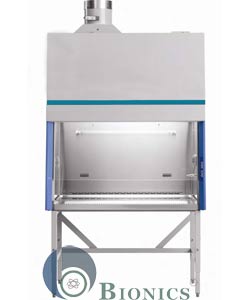Enhancing Laboratory Safety with Class 2 Biosafety Cabinets and Microbiological Protection

Maintaining a safe lab environment is crucial in today’s advanced research and clinical setups. Whether it's conducting biological tests, diagnostics, or experiments with infectious agents, biosafety cabinets are central to preventing cross-contamination and safeguarding personnel.
Class 2 Biosafety Cabinets are widely adopted for offering three-way protection. These units are indispensable tools for pathogen handling and biological research.
Overview of Biosafety Cabinets in Laboratory Environments
Biosafety cabinets are airflow-controlled workspaces engineered for microbiological safety. They use advanced filters to trap harmful particles before air re-enters the lab.
These units are generally classified into three main types: Class I, II, and III based on containment level. Among these, Class 2 biosafety cabinets are the standard choice for most applications.
Defining Class 2 Biosafety Cabinets and Their Role
Class 2 Biosafety Cabinets offer simultaneous protection for people, processes, and surroundings. They utilise downward laminar airflow within a sealed system.
Air is treated using dual filtration systems to ensure safe circulation and exhaust. These cabinets are ideal for work involving moderate-risk pathogens (BSL-2/3).
Essential Features of Class 2 Safety Cabinets
A Class 2 microbiological safety cabinet includes several integrated safety mechanisms such as:
• HEPA/ULPA filtration to trap microbes and particles
• Laminar airflow that minimises disruption and contamination
• Negative pressure barriers to prevent leakage
• Built-in UV sterilisation for decontaminating surfaces
• Quiet operation and ergonomic design for user comfort
• Transparent sash or viewing window for easy access and monitoring
These elements ensure safety, comfort, and efficiency in day-to-day lab tasks.
Applications in Research and Healthcare
Class 2 Biosafety Cabinets are key equipment in healthcare, molecular biology, and quality control. They are ideal for safe handling of samples during testing and experimentation.
From universities to private pathology labs, Class 2 cabinets ensure lab hygiene and sample integrity.
Benefits of Using Class 2 Biosafety Cabinets
Using Class 2 cabinets offers multiple advantages including operator protection and experimental reliability:
• Protects the integrity of lab work
• Shields operators from harmful aerosols and pathogens
• Minimises lab contamination and pollution risks
These cabinets combine safety features with operational efficiency.
Cabinet Types and Global Compliance
Top manufacturers build Class 2 cabinets in accordance with strict international guidelines. Class 2 units are sub-classified as A1, A2, B1, and B2—each with distinct airflow and exhaust features.
• Type A2: Recirculates 70% and exhausts 30% of filtered air
• Type B2: Suited for labs dealing with toxic agents
Matching the cabinet type to your process is essential.
How to Select a Class 2 Safety Cabinet
Before purchasing, consider:
• The biosafety level required (BSL-1, BSL-2, or BSL-3)
• Available lab space and utility infrastructure
• Operational costs and technical support options
• Warranty, training, and certification services
Consulting with experts ensures the cabinet fits both budget and compliance goals.
Safe Setup and Operation of Class 2 Cabinets
For optimal results:
• Install the cabinet in a draft-free, low-traffic zone
• Get periodic validation from certified technicians
• Ensure operators follow best practices
Operational best practices include:
• Always wear appropriate lab PPE
• Work calmly to prevent airflow disturbances
• Wipe work areas with disinfectants regularly
• Treat UV usage as an overnight sterilisation method
Why Class 2 Cabinets Are a Must-Have in Labs
Class 2 biosafety cabinets are a cornerstone of any safe, efficient laboratory. They ensure contamination-free experiments and personnel safety.
From clinical research to Class 2 Biosafety Cabinets vaccine development, Class II cabinets maintain sterility in sensitive procedures. When investing in a biosafety cabinet, choose performance and reliability over cost-cutting—because safe science starts with smart containment.